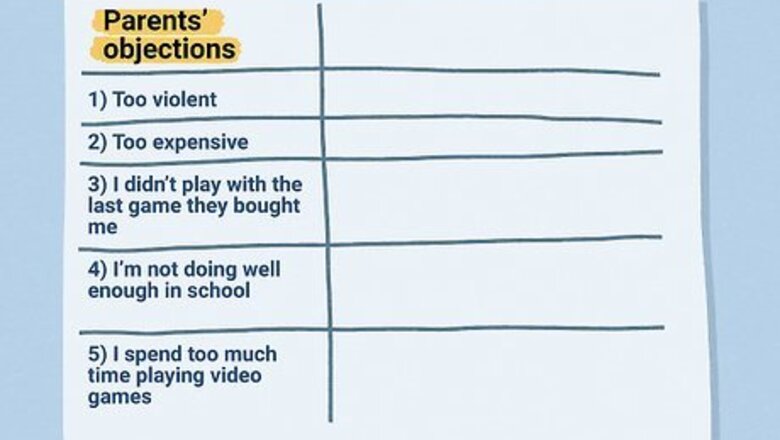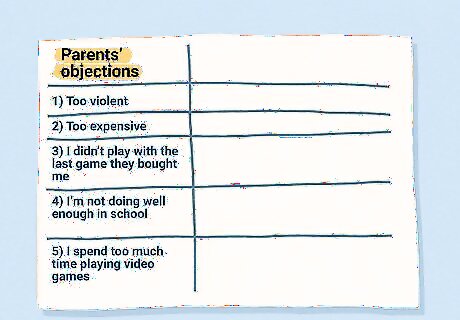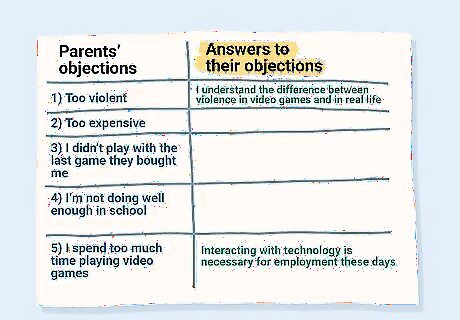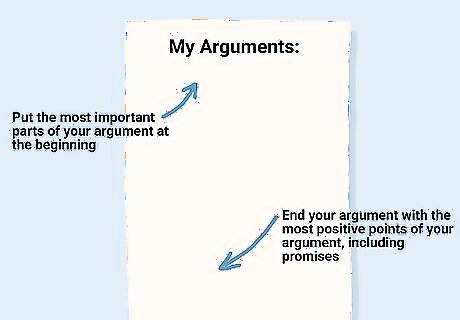
views
Preparing Your Case

Anticipate your parents’ objections. They might have several reasons why they don’t want to have a video game, so you’ll need to be prepared to refute all of their arguments. Make a thorough list of all the reasons you can think of that they would say no to your request. Draw from previous arguments they may have made about video games to help flesh out your list. Some examples might be: Too Violent Too expensive You didn’t play with the last game they bought you You’re not doing well enough in school to get a new video game You spend too much time playing video games

Brainstorm your answers to their objections. When you’re in the heat of the moment during a conversation with your parents, you might not be able to think as quickly or as clearly as you’d like. It’s always best to plan your points ahead of time. Write down all of your refutations of your parent's objections and commit them to memory, so you’ll remember them when you need them. Point out that there’s research that suggests that playing action-oriented video games improves people’s ability to process information quickly. Point out that interacting with technology is an important part of life that’s necessary for employment these days.

Create an outline of your argument. The order in which you present the points of your argument is very important, so you should place them in the best possible order in an outline before you talk to your parents. Because they will likely say “no” at first, you want to put the most important parts of your argument at the beginning. End your argument with the most positive points of your argument, including promises for how you will earn this privilege. Some examples of early/major points might be: a demonstration that you understand the difference between violence in video games and real life; promising to get a part-time job to help pay for the game; promising to adhere to a strict schedule so that you don’t spend too much time playing the game; promising to raise your grades Some examples of closing/minor points might be: promising to give the game up if you fail to meet any of the more important terms of the agreement, such as letting your grades slip; promising to do extra chores around the house for a month or two as an added incentive; etc.

Revise your outline into speaking notes or a written speech. Speaking from notes allows you to make more eye contact with your audience, which makes them trust and believe more in you. It also makes you look like you know your argument inside and out, and that you’re speaking from conviction. However, speaking from notes is a difficult task to master, so if you’re more comfortable, just write out your argument like an essay for school. You can read it when you talk to your parents. Speaking notes should outline your argument as concisely as possible, without too much detail. You don’t want to look like you’re reading your whole argument; you want just enough detail to spark your memory so you can explain the point in your own words. Use symbols or visual clues on your outline to help jog your memory more easily and quickly than words. For example, you might put words that you want to speak slowly, with great emphasis, in bold. You might leave a blank line or a line of asterisks where you want to pause for emphasis.

Practice your presentation. You want to be as familiar with your points as you possibly can be before talking to your parents. Present your argument from your notes or speech where your parents can’t hear you. Deliver your presentation into a mirror so you can practice making eye contact with your reflection.
Making Your Case

Drop hints. Don’t drop your request on them out of the blue. Instead, bring up the game without asking them for it for a week or so. Tell them, in casual conversation, that you tried out this new game at a friend’s house, and that it was so much fun! They’ll probably know that you’re buttering them up for your actual request, but at least they won’t be surprised when you ask them.

Pick a good time to talk. Waiting until your parents seem distracted might seem like a good idea at first; after all, if they’re distracted they’re more likely to say yes, right? They’ll probably be able to tell that you’re trying to slide a request in under the radar and get mad at you for being sneaky. Find a time when your parents are relaxed and in a good mood, and can focus on talking with you for a few minutes.

Address both parents together. When it comes to decisions like this, both parents are going to have to agree on the purchase. Even if one parent is more likely to say yes if you approach them alone at first, he or she will still have to run it by the other parent before buying the game. It’s better to just talk to both of your parents at once, like ripping off a Band-Aid.

Give a full presentation. Ask them ahead of time to let you give your full presentation without any interruptions. Show them the speech or presentation notes you’ve prepared for this discussion; hopefully, they’ll be so impressed, that they’ll start softening their position on the video game issue before you even begin your argument! If you don’t feel comfortable speaking from notes, feel free to type out a full speech and read it directly off the page.

Speak clearly and directly. When making an argument, you have to make sure that your parents can hear and understand you! Speak loudly, and make as much eye contact with your parents as you can without losing your place in your presentation. Drop hints to encourage discussion. "What helped most in this article was the dropping hints. For example, I said "Mom I really liked this game I played at my friends house." She asked me what it was called, and when I told her she gave me permission to get it." - Reilli B. Make a strong pitch. "After following these steps. my parents got me the game! They said that because I spoke loudly, clearly and had good points that they would think about it. I was really nervous at first, but it worked out. They said they liked how I thought about what I was saying!" - Samuel P. Consider your parent’s perspective. "After using these tips I was allowed to buy Project Mirai Deluxe! My parents thought it was a baby game, but this article made me think of their point of view which helped me convince them." - Charlie W. Have a story our readers should hear? Share it with 1 billion+ annual wikiHow users. Tell us your story here.

Strike the right tone. The last thing you want to do is undo all your hard work and preparation by sounding rude or childish. Being polite and respectful throughout demonstrates to your parents that you’re taking the discussion seriously and that you’re mature enough to have your request granted. If your parents say no at first, don’t immediately lose your temper. The argument’s not lost yet! Calmly consider any reasons they may give you for their refusal and do your best to offer solutions to their concerns.

Don’t push your luck. Even after all your hard work, your parents might still say no. If that’s the case, you should drop the issue after exhausting the argument. Nagging them will only irritate your parents and make them less likely to grant the next request you make.















Comments
0 comment